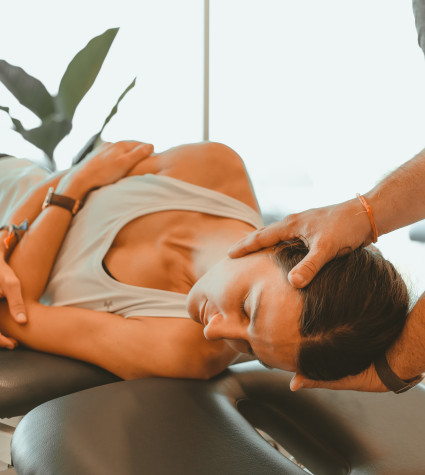Vestibular Rehabilitation


Vestibular rehabilitation is a physiotherapy approach based on manoeuvres and exercises to relieve symptoms often caused by damage to the vestibular system, located in the inner ear. The vestibular system plays an important role in maintaining balance and perception of the body in space.
This approach treats many conditions such as benign paroxysmal positional vertigo (BPPV), labyrinthitis, neuronitis or neuritis, vestibular migraines, head trauma and also helps in the management of Meniere’s disease symptoms.
What happens during an appointment?
The professional evaluates the functioning of the vestibular system in order to determine the cause of these very common but under-diagnosed symptoms. Various manoeuvres and treatment techniques can be performed by the physiotherapist to reduce the intensity and duration of dizziness and vertigo, improve balance and reduce the risk of falls. A personalized and specific exercise program is also established to promote brain habituation.

What is the difference between dizziness and vertigo?
Vertigo is a sensation where you feel like the room is spinning 360 degrees. Dizziness can cause many different sensations; feeling like you're on a boat, feeling like you're being pulled to the side, falling backwards, looking at something and things are moving, feeling lightheaded or drunk. There are many ways to feel dizzy, so don't hesitate to mention it to your therapist.
Interesting facts
Often, vestibular disorders are associated with nystagmus. What is nystagmus? Nystagmus is an involuntary movement of both eyes that is rhythmic, rapid, jerky and alternately changes direction. So don’t be surprised if we look closely at your eyes during the evaluation, because the answer is there!
Did you know that it can be normal to feel tinnitus or ringing in your ears when you have certain vestibular disorders? Therefore, it is important to mention it to your therapist during the evaluation.
In some cases, it is relevant to improve the vestibulo-ocular reflex. What is the vestibulo-ocular reflex? It is a reflex of the eyes that sends them in the opposite direction of the head’s movement, to maintain a clear and stable vision of the surroundings during head movements, which is very useful when driving for example.




